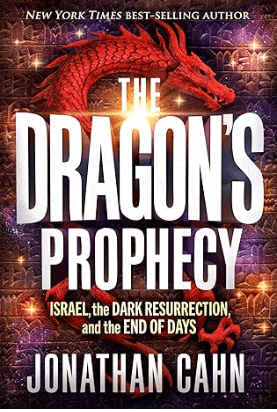Was Iran’s President Struck Down by an Ancient Curse?
Jonathan Cahn’s New Book Reveals an Ancient Bible Mystery That Serves As a
Warning in Modern Times
On May 19, 2024, the helicopter carrying Ebrahim Raisi, the president of Iran, crashed into a mountain and Raisi was killed.
Is there more to the story than meets the eye? Was his death prophetic, the manifestation of a spiritual event, the unfolding of an ancient mystery in the Bible that stretches back thousands of years?
In his new blockbuster bestseller, “The Dragon’s Prophecy: Israel, The Dark Resurrection, and the End of Times,” Jonathan Cahn opens up the mystery of the man who touched a covenant of God that would end up destroying him.
Struck Down
In “The Dragon’s Prophecy,” Cahn outlines the background of Iran’s President Raisi. “He was the leader of Iran under the Ayatollah,” Cahn says. “He wore a black turban claiming to be a descendant of Muhammad, and many expected him to be the Ayatollah’s successor—to become the supreme leader.”
Raisi was infamous among his own people as a minister of death. “They called him the ‘Butcher of Teheran,’” Cahn says. “Raisi was responsible for the brutal repression of Iranian dissidents. He served as a judge in the Iranian Death Commission. He would be accused of sentencing without a trial thou-sands of innocent Iranians to their deaths. He would be cited for committing crimes against humanity.”
Not only that, but Raisi was the one behind Iran’s the direct attack on the land of Israel. “He was the one who empowered Hamas and enabled it to invade Israel on Oct. 7,” Cahn says. “And then on May 19, he himself was struck down.”
The Abraham Connection
Raisi’s first name, Ebrahim, comes from Abraham of the Bible, God’s covenant man. “Raisi was named after the father of the Jewish people,” Cahn explains. “Yet he was their enemy. Raisi bore the name of their father, the one who was promised a multitude of children, yet he sought to destroy them. He declared war on Abraham’s children, even though he was named after the one who was given the Abrahamic Covenant.”
In Genesis 12:3 God says to Abram, “I will bless those who bless you, and I will curse him who curses you.” Cahn asks the stunning question: Could this 4,000-year-old covenant lie behind what happened to Raisi in the mountains of Iran?
“God says if you bless Israel—the Jewish people—you will be blessed, but if you curse Israel, you will be cursed,” he notes. “It’s a word of warning to every hater of Israel and all antisemites around the world. And it’s a warning to all who are raging on college campuses today: If you curse Israel you will be cursed. That’s a law.”

To order Jonathan Cahn’s newest book, “The Dragon’s Prophecy,” visit Amazon.com.
Furthermore, Cahn points out, that law implies reciprocity. “Whatever you do to Israel will be done back to you. Bless them and you’ll be blessed—curse them and you’ll be cursed.”
Could This Ancient Mystery Lie Behind Raisi’s Death?
“Ebrahim Raisi was a hater of Israel,” says Cahn. “Israeli leaders viewed him as the worst of Israel’s enemies. What did he do in recent times that could have led to this? He invoked the ancient Abrahamic Covenant.”
Raisi was the first leader of Iran to preside over the launching of 350 missiles into the land of Israel. He touched the “apple of God’s eye,” as spoken of in Zechariah 2:8. And one month later he was dead.
“The Abrahamic Covenant says when you curse Israel you’ll be cursed, but also what you do to the children of Israel will be done to you,” says Cahn. “What did Raisi do? He sent death and destruction through the air, in the sky above Israel. And what happened to him? One month later, death and destruction came to him in the air, in the sky.”
Cahn also points out that the objects Raisi sent into Israel were brought down by Israel’s defense system. “So now the object in which he flew through the sky was brought down by an unseen hand. Raisi sought to bring destruction and death to Israel through airborne objects that would bring death and destruction by crashing into the earth. So what happened to him? He was riding in an airborne object, and it brought destruction to him by crashing into the earth. He sought death by the crashing of an object, and death came to him by crashing into the earth.”
A Shocking Comparison
Cahn then goes on to draw a stunning parallel of what happens to powers that come against God’s people Israel. “The first kingdom to come against Israel was Egypt,” he says. “The day that broke the power of Egypt was Passover, which commemorates Israel’s deliverance. President Raisi was the leader of a modern nation that sought Israel’s destruction and he issued his threat to annihilate Israel on April 23, 2024. That day was Passover. “
Breaking News. Spirit-Filled Stories. Subscribe to Charisma on YouTube now!
Could that shocking comparison constitute a sign portending the destruction of his power and his life? Cahn says yes. “On the day that Raisi threatened to destroy Israel, the people of Israel were celebrating Passover, the commemoration of the day God delivered them from the power of an evil leader. And God would deliver them again.”
Can says that what Raisi did on that Passover day was more than a threat—he planned to destroy the work of God, nullify the promise of God and eradicate the purposes of God. “It was an act of blasphemy,” he says. “The fact that he committed it on a Hebrew holy day, Passover, was a double blasphemy. And the fact that he had done so after actually attempting to bring destruction to that nation and striking the apple of God’s eye was a triple blasphemy. He had no idea what he was doing or what he was invoking.”
The Appointed Scripture
There is another chilling parallel in the story. Every Sabbath day there is a passage of Scripture appointed from ages past that Jewish people read on that particular Sabbath. “Raisi was killed on the day after the Sabbath,” recounts Cahn. “So on the day before he died, there was an appointed Scripture. It would be read, recited and chanted by the Jewish people throughout Israel and throughout the world.”
What was the appointed word? It came from the book of Leviticus and spoke of the holy days of Israel, starting with Passover, the day on which Raisi had committed his blasphemy. “But it would conclude with a unique account and then a command. It spoke of a man who had committed an act of blasphemy,” Cahn says.
“So Raisi had committed an act of blasphemy. His acts were unique in the history of the Iranian-Israeli conflict. He had both struck the land of Israel and then followed it up with an act of blasphemy. It would not end well. And the appointed Scripture had foretold it.”
So what was the result? Leviticus 24:16 says, “Whoever blasphemes the name of the Lord shall surely be put to death….”
“This is the law concerning blasphemy,” Cahn notes. “It does not apply to the Jewish people only. That verse goes on to say that it applies to the stranger as well as him who is born in the land.
“Raisi had blasphemed the name of the Lord. The very last words of that Scripture say that the man who committed blasphemy was to be taken outside the camp and put to death. So Raisi would be taken outside the camp of his people, to the mountainous outskirts of Iran and there, he who had blasphemed the Lord, was put to death. He had spoken the blasphemy on April 23. The following month, on May 23, exactly 30 days after he spoke it, they laid his body in a tomb.”
A Dangerous Thing
Raisi was powerful in Iran, but he had not considered that by waging war against Israel, the God of Israel would wage war against him. “He hadn’t bargained for the covenant made with the man whose name he bore,” says Cahn, “and that by that covenant what he had done and planned to do to Israel would be done to him. He touched the apple of God’s eye and threatening Israel’s annihilation, an act of blasphemy. And then he was gone.
“He joined a long list of fallen tyrants, evildoers, anti-Semites, blasphemers, and assorted monsters of history. These are people who learned the hard way that the God of the universe also happens to be the God of Israel, and the God of Israel happens also to be the Almighty.”
Against the Mountains
In Ezekiel’s prophecy of Israel’s end-time invasion, God gives this word to the invaders: “I will … bring you against the mountains . … You shall fall upon the mountains …” (Ezek. 39:2-4).
“Raisi was the first leader of a nation cited in the prophecy to actually launch an attack on Israel,” Cahn points out. “And what was his fate? He was brought against the mountains. He led one of those nations mentioned in that prophecy and was the first of those nations to strike Israel.
“And so on May 19, 2024, he was not only struck down—he was brought down against the mountains.”
Cahn says that Raisi’s fall can be taken as a shadow of its coming judgment on the mountains.
“His fate was that of those who will, at the appointed time, attack the land. Just one month after the first of Ezekiel’s nations attacked the land of Israel, its leader would literally fall—his life ended as fell upon the mountains.”
Cahn goes on to issue a sobering warning: “It’s not a wise thing to rage against Israel or the Jewish people. It doesn’t end well. It’s a dangerous thing. The examples throughout history are nearly endless. And now we have the latest example: Ebrahim Raisi’s helicopter crashing into a mountain.”
Join Charisma Magazine Online to follow everything the Holy Spirit is doing around the world!

Jonathan Cahn is the author of his just-released book “The Dragon’s Prophecy,” available wherever books are sold. He is the author of numerous New York Times best-selling books. He was named along with Billy Graham as one of the top 40 spiritual leaders who radically impacted our world. He has spoken at the United Nations and on Capitol Hill. His messages on the web (Jonathan Cahn YouTube) have received over 100 million views. He leads Hope of the World (hopeoftheworld.org), a compassion outreach to the world’s most needy and the Jerusalem Center/ Beth Israel, a worship center made up of all peoples, in Wayne, New Jersey.
Prepared by Charisma Media Staff.















































